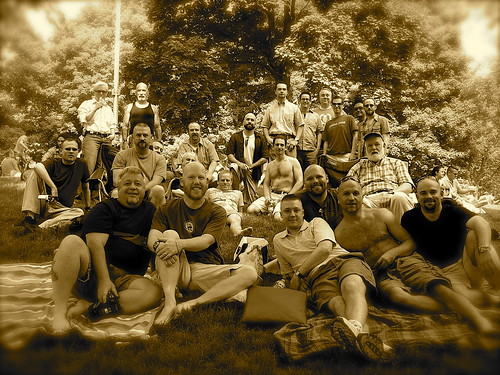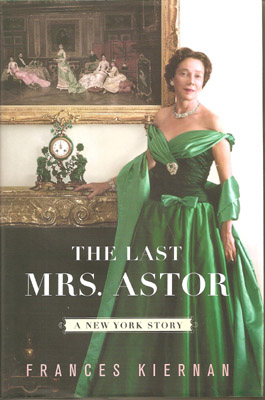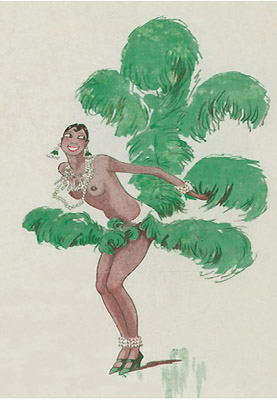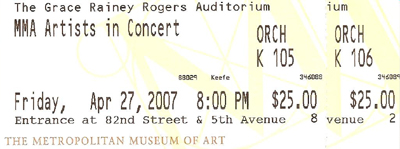In which we have a look at this week's
New York Times Book Review.
Lots of good books this week, including important biographies of Edith
Wharton, George F Kennan, Lincoln Kirstein, and Gertrude Bell. Oh for the time
to read all of them! I'm not entirely sure that I'd have bought Hermione Lee's
Wharton book if I'd read Claire Messud's review first; although she's
enthusiastic about the book, Messud finds an air of effort in the production,
something that she rightly declares to be missing from Ms Lee's Virginia
Woolf. In other words, I can no longer expect a Wharton completely refreshed
from the magisterial treatment of R W B Lewis in 1976, as Ms Lee refreshed Woolf
from such portraits as Quentin Bell's.
Sandor Marai's The Rebels has the air - all unread - of Major
International Fiction.
Henry Alford's Essay, "Genius!", concerns "misblurbing." Yes, Virginia, there
are still people who rely on blurbs. Apparently. I'm shocked, shocked to read of
the fiendish things that marketers do to get boffo quotes for their dust
jackets. Thank you, Mr Alford, for this TIMELY! report on a VITAL! and
FASCINATING! matter.
Yes
The
following titles appear to deserve coverage in the Book Review. The
reviews may still be inadequate or useless.
Halflife, by Megan O'Rourke. Joel Brouwer's appreciation of Ms
O'Rourke's verse is infectious, and he quotes plenty of it. Of the first poem's
opening line, "My poor eye," Mr Brouwer writes,
In fact, the sentence neatly encapsulates the central drama of
O'Rourke's poems: the tremendous difficulty of writing clearly and
adequately ... about things longed for but never seen ... and things so
terrible they should never have to be seen.
A Far Country, by Daniel Mason. Matt Steinglass considers this novel
to be even better than Mr Mason's well-received The Piano Tuner. The
"simple plot" concerns the attempt of a country girl, probably Brazilian, to
find her brother in "the city."
Ultimately, the debt A Far Country owes to Black
Orpheus only testifies to the enduring power of its narrative in
third-world life. The fear that animates Isabel's quest is the terror not of
poverty but of being lost: stripped away from one's village, one's family,
from anything one might call home.
The Rebels, by Sandor Marai (translated by George Szirtes).
According to Tibor Fischer, this novel about a group of adolescents about to be
packed off to World War I "fires on all narrative cylinders" and has been
"gracefully" translated. Marai spent his later decades in the United States, but
he doesn't seem to have made much of an effort to sell his work in English; that
is being changed now, with a stream of praise-winning volumes, of which The
Rebels is said to be one of the more remarkable.
Marai wrote only a handful of plays, but he injected a strong
theatricality into many of his novels. His characters tend to be either
laconic or torrentially talkative. Costume and pretense fascinated him, and
the boys of The Revels stage an impromptu private performance in the
city's theatre under the guidance of a sinister, itinerant actor, an evening
that will cost them dear.
Edith Wharton, by Hermione Lee. Claire Messud's lengthy and favorable
review consists mostly of storytelling - as indeed do most reviews of
biographies. It's as though the reviewer has taken on the burden of "selling"
the subject's life story to benighted readers. Where the subject is a novelist
of Wharton's eminence, one might expect more literary assessment than resume.
The review ends on a cautionary note.
In the end, too, there is about Hermione Lee's remarkable
biography a slight air of unfulfillment, as if for her biographer Wharton
were ultimately more an admirable effort than a beloved subject. (It is an
air, incidentally, completely absent from Lee's marvelous Virginia Woolf,
a more thoroughly absorbing and affecting book.) Nobody has done Edith
Wharton such careful justice as Lee, who has brilliant illuminated so many
of the rooms in Wharton's vast interior house. But perhaps because these
rooms are so fully furnished and their trappings so well rendered, it is at
times difficult to see clearly, or indeed fully to embrace, the lonely
innermost soul herself. Such detachment is undoubtedly the biographer's job,
but it also reflects, as Wharton unflinchingly believed, what life is like.
The Worlds of Lincoln Kirstein, by Martin Duberman. This impressive
life of a remarkable New Yorker, best-known for his founding role with the New
York City Ballet, gets high marks from Dwight Garner.
Kirstein remains something of an enigma, a hollow man, at the
close of The Worlds of Lincoln Kirstein, but it's hard to blame
Duberman. Kirstein's personality ran to extremes; raging blowups were
followed by acts of extreme kindness. His temper, which only got worse with
age, confused even those closest to him. "One could be embraced on Monday,
cut dead on Tuesday," Duberman writes. "Lincoln's gaze was tantamount to
spinning the revolver changer for Russian roulette.
Gertrude Bell: Queen of the Desert, Shaper of Nations, by Georgina
Howell. Gertrude Bell was remarkable for insisting that she be allowed to take a
major role in geopolitics; like so many accomplished women of the late
Nineteenth and early Twentieth Centuries, she was not a feminist, and held most
women in disregard. Fluent in Arabic and Persian, she shaped Iraq. Robert F
Worth says that Ms Howell's books is "breathless, somewhat worshipful."
When it comes to Iraq, Howell accepts Bell's own views too
readily, both about herself and about the broader British imperial vision.
At one point Howell refers in passing to "the peculiarly British notion of
public service free of corruption" as if it were an unmixed gift to subject
peoples.
Troublesome Young Men: The Revels Who Brought Churchill to Power and
Helped Save England, by Lynne Olson. Jon Meacham writes a favorable and
helpful review. Calling the book "brisk, engaging," he goes on,
Olson, a former White House correspondent for The Baltimore
Sun, has given us a fascinating snapshot of the Tory "rebels," as she
calls them, who ultimately opposed Neville Chamberlain and helped elevate
the then-unbeatified Churchill.
George Kennan: A Study of Character, by John Lukacs.
In retrospect, George F Kennan may stand forth as the most eminent American of
the Twentieth Century after FDR. Because he outlined a successful strategy for
waging the Cold War, and did it so persuasively that successive leaders adopted
it, he is the ultimate victor, the Wellington in a war without battles. James
Traub's review is favorable but somewhat uncomfortable, given Kennan's WASPy
disdain for people of other origins. (Indeed, the review reminded me of Matt
Damon's character's breathtaking remark in The Good Shepherd, "We have
the United States. The rest of you are just visitors.") But Mr Traub praises Mr
Lukacs (who knew Kennan well) for including the full text of a Kennan speech
delivered at Notre Dame in 1953 that denounced ideology of any kind.
The Day of the Barbarians: The Battle That Led to the Fall of the Roman
Empire, by Alessandro Barbero (translated by John Cullen). This book, about
the battle of Adrianople in 378 CE, in which Gothic forces obliterated the
Eastern Empire's army, gets high praise from Steve Coates.
One of the many paradoxes in Barbero's elegant and pleasurable
little account - what a joy it is to read about the ancient world in
digestible portions - is that the Eastern empire learned from its experience
and intentionally shifted its barbarians farther and farther toward the
West. Despite being the site of the first irreparable crack in the imperial
fabric, the East lived on as the Byzantine Empire and remained stable and
strong long after the shell of the West had crumbled under the barbarian
onslaught.
Freedom's Power: The True Force of Liberalism, by Paul Starr. Michael
Lind is quite enthusiastic about this book; I wish his review were somewhat more
lucid, which I suspect it would have been had it been given a little more room.
Mr Lind says many good things about the book, but can't begin to back them up
with arguments of any complexity, and the review tends to read as a series of
topic sentences. Through the fog, an important book seems about to emerge.
A Guest in My Own Country: A Hungarian Life, by George Konrad
(translated by Jim Tucker and edited by Michael Henry Heim). Alan Riding likes
this amiable memoir by the sometime-underground Hungarian writer.
It is a story inescapably dominated by the Holocaust and a
Communist dictatorship, but it is also very much a person story, one in
which tragedy, fear, resistance and tedium are accompanied by humor,
mischief, successes and a good deal of skirt-chasing.
Maybe
It is
difficult to tell whether these books are actually as indifferent or pointless as the
reviews suggest.
The House on Boulevard St: New and Selected Poems, by David Kirby.
Carol Muske-Dukes gives this collection a mordant review. It concludes,
Yet these poems have less to do with "inkpots" or memory or
innovation that they do with "splattering the canvases." Kirby stretches his
backdrop, then "paints with breath-long brushstrokes. It seems right that
he's been immortalized in a Lichtenstein-style cameo. Like the cover, these
poems may be too cool for words.
The Pesthouse, by Jim Crace. Francine Prose's review of this
"post-apocalyptic" novel starts out on a neutral-to-positive note, but it ends
rather dismally, wondering why "American primitives should sound like refugees
from a Thomas Hardy novel," and faulting Mr Crace's unoriginality.
It's disorienting and a little disturbing - like some sort of odd
déjà vu - to read about the hell of the future and feel that we've been
there before.
Helpless, by Barbara Gowdy.
Chelsea Cain clearly likes this book, but her remarks are confusing. She faults
a nine year-old girl for not being "fully formed." Although she praises the
book's lean, suspenseful writing, she fails to make it clear why this book about
a sexual predator who tries to keep his hands off the child whom he has locked
in his basement is worth reading.
The Miracle of Catfish: A Novel in Progress, by Larry Brown.
I had never heard of Larry Brown before reading this review, and I'm still
puzzled by Beverly Lowry's reverential review. It appears that the writer died
and left an unfinished manuscript, which is this book, very lightly edited by
Shannon Ravenel. The action takes place in and around Oxford, Mississippi, but
Ms Lowry never gets round to placing the book on a continuum between Oxford's
literary poles, William Faulkner and John Grisham. In the absence of an an
extensive quoted passage, I'm inclined to regard Brown as an acquired, regional
taste.
The Visible World, by Mark Slouka. Eva Hoffman likes this novel
about growing up in Queens with haunted parents, but
not the novel within the novel, which is the protagonist's attempt to understand
his mother's past..
Unfortunately, the fiction the narrator invents is a tale of love
and war so fantastically and at the same time conventionally romantic that
it strains the modern reader's patience, rather than reinforcing imaginative
conviction.
Too Close to the Sun: The Ambitious Life and Times of Denys Finch Hatton,
by Sara Wheeler. The subject of this book, Florence Williams, "is best known for
being a lover of interesting women," most notably Karen Blixen (Isak Dinesen).
Everyone liked and many people loved Denys Finch Hatton. Few knew
him well, and no one could ever fully understand him, certainly not his
lovers, and, ultimately, not Sara Wheeler. But just as Blixen might have
said, knowing him a little was worth the ride.
Bigger Than Life: A Murder, a Memoir, by Dinah Lenney.
The author's father led an interesting, if somewhat distant, life, but one that
ended in kidnapping and murder. Tara McKelvey
is not very sympathetic:
Bigger Than Life, which is part of Tobias Wolff's American
Lives series, is an uneven, confused memoir, guided by emotional logic and a
sense of entitlement. This may work in a therapist's office. ... Sadly,
though, Lenney seems unable to process the trauma of her father's murder to
the extent necessary for a memoir.
The River Queen: A Memoir, by Mary Morris. Jennifer Gilmore wants to
like this trip down the Mississippi more than she does.
Although her boating skills are never honed, it's to her credit
as a writer that the river and its history never cease to provide apt
metaphors for her own changing life.
That's very nice,
but it's undercut by the suggestion that the book's structure works against its
impact. I should say that Ms Gilmore needed more than a column to unpack her
ideas.
No
These books, if they deserve coverage at all, ought to grace
other sections of The New York Times.
The New American Story, by Bill Bradley.
This mission statement only looks like a book. It is really a political
pamphlet, devoid of literary value - and rightly so. Politicians, even when
they're retired, are by nature tendentious, setting things out as they wishes
them to be seen. Mr Bradley's contents may be better or worse than the norm, but
nothing can persuade me that they belong between the covers of a book, intended
to be read by a normal human being. Timothy Noah, incidentally, isn't impressed.
He faults Mr Bradley for structuring his material in a way that "allows him to
maintain senatorial decorum while enjoying maximum freedom to create straw men."











